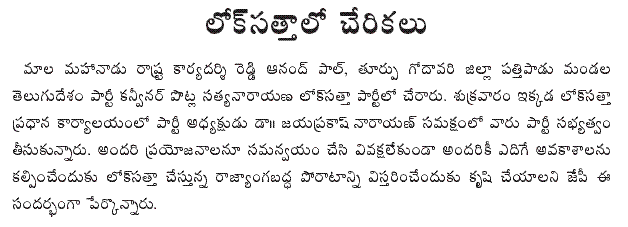Lok Satta opposes reservations Beyond 50 percent
The Lok Satta Party has reiterated its stand that caste-based reservations for admission to educational institutions and jobs in the Government should under no circumstances be raised beyond 50 percent as stipulated by the Supreme Court.
The party’s Working Committee, which concluded its two-day session yesterday, wanted the Government to deny reservations to the creamy layer and those who have already become prosperous and enjoyed high positions because of reservations.
Briefing media on the party’s deliberations, Working President D. V. V. S. Varma, and leaders Bhisetty Babji, P. Bhaskara Rao and Eda Chennayya said that 10 percent grace marks be awarded in competitive examinations to rural children and poor urban children without reference to their caste or religion. Such an arrangement would render justice to disadvantaged children.
The party demanded that the Government ensure quality education including English and computers to all children up to the 12th standard. TheGovernment should also ensure that no eligible and desirous student is denied the opportunity to pursue higher education because of poverty.
The leaders pointed out that in the changed political situation an attempt is under way to raise caste-based reservations to serve the short-term political interests of certain sections.
The party recalled that the Supreme Court had not merely capped the reservations for weaker sections at 50 percent but also declared the ceiling formed part of the basic structure of the Constitution. The Supreme Court faulted the Tamil Nadu and Karnataka Governments which exceeded the cap by adopting laws and getting them incorporated in the Ninth Schedule of the Constitution and said it would review the Ninth Schedule itself if other States followed suit.
A lasting solution to the growing demands for caste-based reservations lies not in succumbing to them but to provide growth opportunities to all irrespective of the accident of their birth in a particular caste or religion.
The Lok Satta Party demanded that the Government scrap the Tenancy Act and adopt a new law which will enable tenants to access bank loans, input subsidies and crop insurance without hurting landowners’ interests. It appealed to the Government to convene an all-party meeting to discuss the Krishna Water Dispute Tribunal verdict.
It asked people to pin down elected people’s representatives during ‘rachchabanda’ on provision of relief to rain-hit farmers and tenants, removal of all restrictions on movement of agricultural produce and remunerative prices.
The party decided to implement an action plan on the problems of farmers in rural areas and delivery of civic services in urban areas from February 1. It will be undertaking a membership enrolment drive and holding organizational elections at the village and ward levels in phases.



